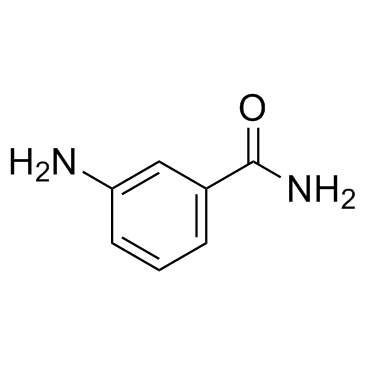3-Aminobenzamide

3-Aminobenzamide structure
|
Common Name | 3-Aminobenzamide | ||
|---|---|---|---|---|
| CAS Number | 3544-24-9 | Molecular Weight | 136.151 | |
| Density | 1.2±0.1 g/cm3 | Boiling Point | 329.6±25.0 °C at 760 mmHg | |
| Molecular Formula | C7H8N2O | Melting Point | 115-116 °C(lit.) | |
| MSDS | Chinese USA | Flash Point | 153.2±23.2 °C | |
| Symbol |

GHS07 |
Signal Word | Warning | |
|
Protein poly(ADP-ribosyl)ation regulates arabidopsis immune gene expression and defense responses.
PLoS Genet. 11(1) , e1004936, (2015) Perception of microbe-associated molecular patterns (MAMPs) elicits transcriptional reprogramming in hosts and activates defense to pathogen attacks. The molecular mechanisms underlying plant pattern-triggered immunity remain elusive. A genetic screen identif... |
|
|
Chemical genetics reveals a complex functional ground state of neural stem cells.
Nat. Chem. Biol. 3(5) , 268-273, (2007) The identification of self-renewing and multipotent neural stem cells (NSCs) in the mammalian brain holds promise for the treatment of neurological diseases and has yielded new insight into brain cancer. However, the complete repertoire of signaling pathways ... |
|
|
One-pot enzymatic conversion of carbon dioxide and utilization for improved microbial growth.
Environ. Sci. Technol. 49(7) , 4466-72, (2015) We developed a process for one-pot CO2 conversion and utilization based on simple conversion of CO2 to bicarbonate at ambient temperature with no energy input, by using the cross-linking-based composites of carboxylated polyaniline nanofibers (cPANFs) and car... |
|
|
Nucleolar integrity is required for the maintenance of long-term synaptic plasticity.
PLoS ONE 9(8) , e104364, (2014) Long-term memory (LTM) formation requires new protein synthesis and new gene expression. Based on our work in Aplysia, we hypothesized that the rRNA genes, stimulation-dependent targets of the enzyme Poly(ADP-ribose) polymerase-1 (PARP-1), are primary effecto... |
|
|
Evolution of poly(ADP-ribose) polymerase-1 (PARP-1) inhibitors. From concept to clinic.
J. Med. Chem. 53 , 4561-84, (2010)
|
|
|
3-Aminobenzamide--a PARP inhibitor enhances the sensitivity of peripheral blood micronucleus and comet assays in mice.
Toxicol. Mech. Methods 24(5) , 332-41, (2014) DNA repair is an essential outcome of DNA damage, which may compromise the end point of various in vitro and in vivo test systems of the genotoxicity evaluation. poly(ADP-ribose) polymerase (PARP) enzymes have an essential role in DNA repair. Here, we investi... |
|
|
Hepatocyte-specific high-mobility group box 1 deletion worsens the injury in liver ischemia/reperfusion: a role for intracellular high-mobility group box 1 in cellular protection.
Hepatology 59(5) , 1984-97, (2014) High-mobility group box 1 (HMGB1) is an abundant chromatin-associated nuclear protein and released into the extracellular milieu during liver ischemia-reperfusion (I/R), signaling activation of proinflammatory cascades. Because the intracellular function of H... |
|
|
PARP-1 mediates LPS-induced HMGB1 release by macrophages through regulation of HMGB1 acetylation.
J. Immunol. 193(12) , 6114-23, (2014) The high-mobility group box protein 1 (HMGB1) is increasingly recognized as an important inflammatory mediator. In some cases, the release of HMGB1 is regulated by poly(ADP-ribose) polymerase-1 (PARP-1), but the mechanism is still unclear. In this study, we r... |
|
|
VERO cells harbor a poly-ADP-ribose belt partnering their epithelial adhesion belt.
PeerJ 2 , e617, (2014) Poly-ADP-ribose (PAR) is a polymer of up to 400 ADP-ribose units synthesized by poly-ADP-ribose-polymerases (PARPs) and degraded by poly-ADP-ribose-glycohydrolase (PARG). Nuclear PAR modulates chromatin compaction, affecting nuclear functions (gene expression... |
|
|
8-Oxoguanine causes neurodegeneration during MUTYH-mediated DNA base excision repair.
J. Clin. Invest. 122(12) , 4344-61, (2012) 8-Oxoguanine (8-oxoG), a common DNA lesion caused by reactive oxygen species, is associated with carcinogenesis and neurodegeneration. Although the mechanism by which 8-oxoG causes carcinogenesis is well understood, the mechanism by which it causes neurodegen... |